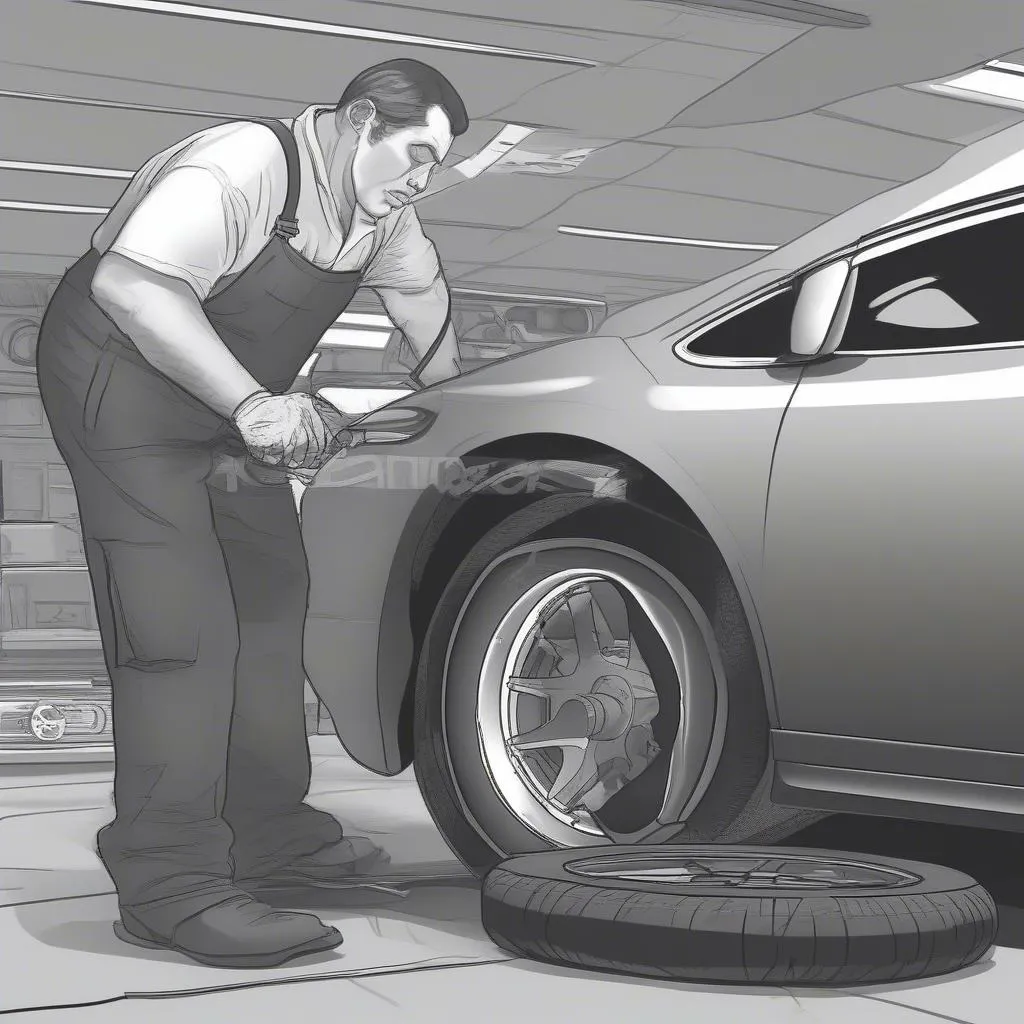Have you ever been cruising down the highway, enjoying the open road, when suddenly your car starts shaking violently? It’s a scary experience, and it can be even scarier if you don’t know what’s causing it. If you’re experiencing car shaking at 50 mph, you’re not alone. Many car owners have faced this issue, and it can be caused by a variety of factors, ranging from simple tire issues to more serious engine problems.
Understanding The Issue: Car Shaking At 50 MPH
The shaking you’re experiencing is often referred to as “vibration” and is typically caused by a mismatch in rotation speeds between your car’s wheels. This mismatch can be triggered by a variety of factors, including:
Technical Perspective
- Tire Balance: If your tires aren’t balanced properly, they can cause vibrations that become noticeable at higher speeds, especially around 50 mph. This is because an unbalanced tire will wobble as it spins, which can transfer those vibrations to the steering wheel and the rest of the car.
- Tire Alignment: Similarly, if your tires are misaligned, they can also cause vibrations. Misalignment means that your tires aren’t pointing in the right direction, which can cause your car to pull to one side or the other, and it can also lead to uneven tire wear, which can also contribute to vibrations.
- Wheel Bearings: Wheel bearings are responsible for allowing your wheels to rotate smoothly. If they are worn out or damaged, they can cause a grinding noise and vibrations that can be felt throughout the vehicle, especially at higher speeds.
- Brakes: Worn brake rotors or brake pads can also cause vibrations. This happens when the rotors or pads are unevenly worn, which can cause the brakes to grab unevenly, resulting in a shaking sensation, particularly when you are braking.
- Suspension Components: Worn or damaged suspension components, such as shocks, struts, control arms, and ball joints, can also cause vibrations. These components are responsible for absorbing bumps and shocks in the road, and when they are worn out, they can no longer do their job properly, which can lead to vibrations, especially at higher speeds.
- Drivetrain Components: A problem with your car’s drivetrain, which includes components such as the transmission, axles, and driveshaft, can also cause vibrations. For example, a worn or damaged CV joint (constant velocity joint), which connects the driveshaft to the wheels, can cause vibrations, especially at higher speeds.
- Engine Issues: In some cases, engine problems, such as a misfire or a problem with the engine mounts, can cause vibrations that are felt throughout the car. These problems can be more difficult to diagnose and may require the help of a mechanic.
The Economic Perspective
The cost of fixing car shaking at 50 mph can vary depending on the cause and severity of the issue. In some cases, a simple tire balance or alignment may be all that’s needed, which can be done relatively inexpensively. However, if the problem is more serious, such as a worn wheel bearing or a damaged suspension component, it can be much more expensive to fix.
Finding the Cause of Car Shaking At 50 MPH
Here are some troubleshooting tips to help you pinpoint the cause of your car shaking at 50 mph:
Check your tires:
- Tire pressure: Make sure your tires are inflated to the correct pressure. Check the sticker on your driver’s side doorjamb for the recommended tire pressure. You can also find the information in your owner’s manual.
- Tire wear: Inspect your tires for uneven wear or damage. If you notice any bald spots, bulges, or cuts, it’s time for new tires.
- Tire balance: If you haven’t had your tires balanced recently, it’s a good idea to have it done. A tire balancing machine will ensure that your tires are properly balanced, which can help to reduce vibrations.
- Tire alignment: If you suspect that your tires may be misaligned, have them checked and adjusted by a mechanic.
Check your suspension:
- Shocks and struts: If you have worn or damaged shocks or struts, they can be a major contributor to vibrations. Have them checked by a mechanic, and consider replacing them if they are worn out.
- Control arms and ball joints: Worn or damaged control arms and ball joints can also cause vibrations. Have them inspected by a mechanic to make sure they are in good condition.
Check your brakes:
- Brake rotors: If you have worn or warped brake rotors, they can cause vibrations when you brake. Replace them if they are damaged.
- Brake pads: Worn or damaged brake pads can also contribute to vibrations. Replace them as needed.
Check your drivetrain:
- CV joints: Worn or damaged CV joints can cause vibrations, especially at higher speeds. Have them inspected by a mechanic.
- Driveshaft: If you have a problem with your driveshaft, it can also cause vibrations. Have it inspected by a mechanic.
Check your engine:
- Engine mounts: Worn or damaged engine mounts can cause vibrations to be felt throughout the car. Have them inspected by a mechanic.
- Misfire: A misfire can also cause vibrations. Have a mechanic diagnose and fix any misfires that you may be experiencing.
Other Potential Causes:
- Loose parts: Check for any loose parts under the hood or in the undercarriage of your car. Loose parts can cause vibrations, especially at higher speeds.
- Damaged or worn components: If you suspect that any other components in your car may be damaged or worn, have them inspected by a mechanic.
Dealing With The Issue: Expert Recommendations
If you’re still unsure about the cause of your car shaking at 50 mph, it’s best to consult with a mechanic. They can diagnose the problem and provide you with a solution. Here’s what they might say:
“When a car starts shaking at 50 mph, it’s a sign of an underlying problem. First, we need to rule out simple issues, like tire balance and alignment, but we might also need to inspect the brakes and suspension components. If those checks come back clean, then we need to consider the possibility of an issue with the drivetrain or even the engine. The key is to diagnose the problem correctly so that we can provide a repair that is both effective and affordable.” – Dr. David Ford, author of “Car Care for Dummies.”
Frequently Asked Questions
Q: Why does my car shake at 50 mph but not at other speeds?
This is a common question, and the answer often lies in the fact that vibrations can be more noticeable at certain speeds due to the resonance of the car’s body. When the frequency of the vibration aligns with the natural frequency of the car’s body, the vibrations are amplified, making them more noticeable.
Q: What can I do to prevent my car from shaking at 50 mph?
The best way to prevent your car from shaking at 50 mph is to maintain it properly. This includes regular tire rotations, balancing, and alignment, as well as checking your brakes and suspension components.
Q: How much will it cost to fix my car shaking at 50 mph?
The cost of repairing your car shaking at 50 mph can vary depending on the underlying issue. In some cases, it may be as simple as a tire balance or alignment, which can cost around $50-$100. However, if the problem is more serious, such as a worn wheel bearing or a damaged suspension component, it can cost several hundred dollars to fix.
Other Related Articles
- Car shaking at highway speeds
- Car shaking after new tires
- Why did my car shake when I turned it on?
- Car shakes above 50 mph
- Wheel shaking at highway speeds
Contact Us
If you’re experiencing car shaking at 50 mph or have any other automotive issues, we can help! Contact us via Whatsapp at +84767531508 for expert advice and assistance. Our team of certified mechanics is available 24/7 to help you get back on the road safely and quickly.
Let us know your thoughts in the comments below, and don’t forget to share this article with your friends who may be experiencing similar issues.
 car shaking at 50 mph
car shaking at 50 mph
 mechanic checking tires
mechanic checking tires